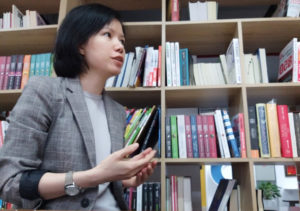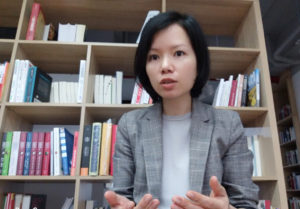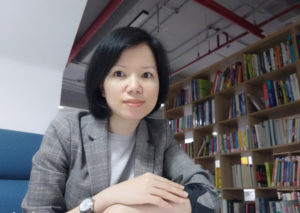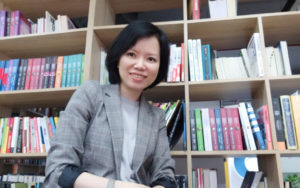Bao Tram Nguyen
Fujitsu Scholar on the 2019 Spring Course
Never Too Late to Start Again
Profile
Producing Manager,
Alpha Books
Interview
Nguyen Bao Tram was already well on her way in her career when she decided to change trajectory and pursue her dreams to study and travel by applying for the Global Leaders for Innovation and Knowledge program. Now back in Vietnam, Bao Tram is practicing her new perspective on leadership in her role as manager at a publishing company and is also working on sustainable solutions to aid impoverished families through a non-profit organization, Project LoHi.
―How did your stance on being a leader change after completing the Global Leaders for Innovation and Knowledge program?
Prior to the program, I had worked as a manager in a newspaper organization with a centralized decision-making structure that focused strictly on policies and regulations to improve effectiveness and deliver results. Autocratic leadership was the management style of each leader at every level of the organization, and back then, I was no exception.
When I returned to Vietnam after the program, I started a new position as the production manager of a publishing company. Now, I no longer practice autocratic leadership, and try to apply a flexible leadership style that adjusts to different circumstances. I’ve become an active listener, welcoming of critical opinions and able to give my staff opportunities to argue with me without fear of being suppressed.
Employees in a private company only follow a leader whom they trust and respect. This is why I aim to demonstrate integrity through my each and every behavior and action. I value leading by example, so I try to behave as a role model for my staff. I credit others when my team is successful, and take responsibility when results are poor.
―What type of leader you would like to become in the future?
Essentially, I want to be an ‘imperfect’ leader, meaning, I always want to continue striving to develop. On the one hand, that is a leader who has self-awareness, who knows what aspects they need to improve and is willing to learn from others. On the other hand, an imperfect leader is also innovative, and never satisfied with what they have achieved today. If a leader is comfortable with where they are, they are probably not growing as a person and see no reason to change.
―What are your major takeaways from the program and how are they helping you now in your day-to-day life?
The two most important takeaways for me are “being innovative” and “being happy,” the most fundamental, essential traits of a leader. Happy leaders are those who find purpose within their work and work with passion, and only happy people can make others around them happy. Meanwhile, innovative leaders are forward-thinking and cause their organization to be forward-thinking as well because they have a vision for the future.
 These two factors are mutually related, and lead to success in my opinion. Moreover, they not only help me in my career but also in my daily life. Since I know the “recipe” to make myself happy, things go smoothly, and I don’t find much pressure around me. I am more productive in my work when I am happy.
These two factors are mutually related, and lead to success in my opinion. Moreover, they not only help me in my career but also in my daily life. Since I know the “recipe” to make myself happy, things go smoothly, and I don’t find much pressure around me. I am more productive in my work when I am happy.
Another thing I learned is about knowledge creation. Now, I’m applying a model that I learned from the Global Leaders for Innovation and Knowledge program centered around the Japanese concept “ba” – providing a context for people to share their input and create new knowledge within the group. Every day, my staff and I take a 15-minute break in the office cafeteria and we discuss all sorts of matters, both about work and in our personal lives. They provide me with valuable information about work and it also helps us become closer to each other as well.
―How would you describe the Global Leaders for Innovation and Knowledge program in a single word?
Limitless. The program’s curriculum is designed with diverse subjects, and these helped me discover my limitless potential. It’s also a limitless journey of exploring the world. Furthermore, the program really helped me understand that happiness is also limitless; it’s not like some shared blanket where if you pull more I will have less. Kindness to others works much the same – you can share your kindness to many people without running out.
―What are your future goals?
 In the short-term, I want to focus on doing my job well and continue learning in this challenging new field of publishing. In my professional life, I want to become a competent manager who leads many initiatives that will contribute to the development of the company.
In the short-term, I want to focus on doing my job well and continue learning in this challenging new field of publishing. In my professional life, I want to become a competent manager who leads many initiatives that will contribute to the development of the company.
At the same time, I want to help my non-profit organization enter its next phase. Originally it began as my Capstone project that I created in Japan on the program, designed to assist homeless youth in Hanoi. However, I came to realize that many of these children came from impoverished families in the highlands, so a partner and I set up Project LoHi (Low Overhead High Impact) to develop and implement long-term sustainable solutions in Vietnam’s remote highland areas.
We provide them a model of sustainable development, helping them to provide for themselves. The program is funded by donations, my partner’s income from English teaching, and also proceeds from books we’ve sold, including a book I wrote about the Global Leaders for Innovation and Knowledge program. But my vision is to change Project LoHi into an NGO, so we can utilize funding provided by the US government.
―Do you have any message to others interested in applying to the program?
 I started this program when I was 37. Some people might think that is too late to study or too late to change. I gave up a very stable income to realize my dream to travel and study new knowledge in the world. It’s never too late to step out of your comfort zone and find out who you truly are. You can see so many different and interesting things that you never would have experienced ordinarily. The Global Leaders for Innovation and Knowledge program will open an exciting path to somewhere that you never would have imagined if you had just stayed in one place.
I started this program when I was 37. Some people might think that is too late to study or too late to change. I gave up a very stable income to realize my dream to travel and study new knowledge in the world. It’s never too late to step out of your comfort zone and find out who you truly are. You can see so many different and interesting things that you never would have experienced ordinarily. The Global Leaders for Innovation and Knowledge program will open an exciting path to somewhere that you never would have imagined if you had just stayed in one place.
―Summaries
① Summary of what was learned, changes in leadership
I no longer practice autocratic leadership and try to apply a flexible leadership style. I’ve become more of an active listener, welcoming of critical opinions and able to give my staff opportunities to argue with me.
② Scenes or situations to apply what was learned on the program
I’m applying a model for knowledge creation centered around the Japanese concept of “ba” – providing a context for people to share their input and create new knowledge within the group.
③ One-sentence summary of the Global Leaders for Innovation and Knowledge
The program’s diverse curriculum helped me discover my limitless potential while the experience itself is a limitless journey of exploring the world.



